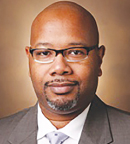More than one-third of men with incurable metastatic prostate cancer mistakenly believe that their cancer may be curable, according to a survey of patient expectations at an academic cancer center.

It’s a fine balance. We don’t want to kill optimism, and we don’t want to overtreat. We do want to improve quality of life and extend survival with our treatments.— Kelvin A. Moses, MD
Tweet this quote
“This study is part of a larger survey of treatment decision-making among men with metastatic prostate cancer. These results at a large academic center suggest that somehow, we are not communicating [clearly] about expected outcomes. We have to become better communicators,” said lead author Kelvin A. Moses, MD, Assistant Professor of Urology, Vanderbilt University Medical Center (VUMC), and Chief of Urology, Nashville General Hospital, at the 2017 Genitourinary Cancers Symposium.1
Dr. Moses explained that at his first consultation with a patient with metastatic prostate cancer, he will tell him the disease is not curable and the goal of treatment is to control the cancer and improve quality of life. “The next time I see that patient, he may be thinking that the large amount of options gives him the possibility of cure. So, it may take repeated discussion to bring patient expectations in line with the reality of their disease,” he said. “It’s a fine balance. We don’t want to kill optimism, and we don’t want to overtreat. We do want to improve quality of life and extend survival with our treatments.”
Dr. Moses, along with co–lead author Alicia Morgans, MD, MPH, of the Department of Medical Oncology at VUMC, believes the results of the study are generalizable to other centers and clinics.
In the current era, multiple systemic therapies are available for the treatment of metastatic prostate cancer, including hormonal agents, systemic radiation, chemotherapy, and immunotherapy. Currently, there is no standard first-line treatment, nor are there evidence-based guidelines for the choice of one agent over another. Patients and providers confer about treatment decisions, and patient expectations are an important influence on choice of therapy.
“Studies suggest that patients with cancer may agree to treatment with otherwise unacceptable toxicity if there is an expectation of cure that is greater than 1%, but they would refuse treatment if cure were not possible,” Dr. Moses said.
Study Details
The study enrolled 100 men between June 1, 2015, and May 15, 2016, who were diagnosed with advanced, incurable, metastatic prostate cancer recruited from Vanderbilt University Medical Center (n = 77) and from a link on the ZERO, The End of Prostate Cancer website (a nonprofit patient advocate organization, n = 23).
What Patients Expect From Treatment for Advanced Prostate Cancer
- A survey at an academic center found that one-third of patients with metastatic prostate cancer believe a cure is possible, and this finding has been replicated in other metastatic cancers.
- Factors contributing to this “gap” in perception include oncologists’ communication skills, patients’ coping style, and the methodology of surveys/studies.
- The conversation with patients with metastatic cancer should be ongoing, reinforcing treatment goals, so they can adjust to their situations over time.
Participants completed surveys of their expectation of cure, symptom relief, and extending survival with their current treatments. “All men were on some sort of hormonal blockade, and the vast majority were on second-line treatment with drugs such as abiraterone [Zytiga], enzalutamide [Xtandi], or sipuleucel-T [Provenge],” Dr. Moses said. The survey was conducted at the time a new therapy was being introduced.
Participants were asked three questions about their perceptions “after speaking with your doctor” related to the likelihood of cure, extending survival, and symptom relief. Patients could choose from a list of responses, ranging from “very likely,” “somewhat likely,” “a little likely,” “not at all likely,” and “don’t know.”
What Patients Believed
A total of 33% said a cure was at least “somewhat likely,” and of these patients, 8% believed a cure was “very likely.” Regarding other expectations, 91% expected treatment would extend survival, and 70% believed treatment could help their cancer-related symptoms to some degree.
In a multivariate analysis adjusted for covariates that included optimism, nonwhite race, unmarried, age, and health status, men with greater optimism and better reported health status had greater odds of expecting cure from their treatment.
“Efforts to align patient and physician expectations are necessary to counsel patients adequately and avoid overtreatment with toxic therapies,” Dr. Moses said. ■
Disclosure: Dr. Moses reported no potential conflicts of interest.
Reference


